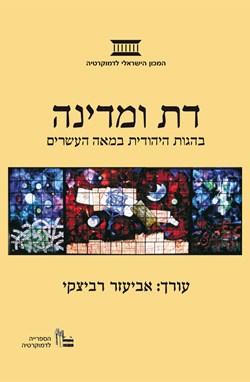Religion and State in Twentieth-Century Jewish Thought
- Edited By: Aviezer Ravitzky
- Publication Date:
- Cover Type: Hardcover
- Number Of Pages: 572 Pages
- Center: Religion and State Program
- Price: 135 NIS
The book centers on the work of Jewish political thinkers with different ideological affiliations and from different countries. After a thematic clarification of fundamental questions on the religion and state problem, the bulk of the book is devoted to a discussion of the writings and views of major thinkers, ending with reflections about the place of Judaism in a Jewish and democratic state.
The relationship between religion and state is among the most vital issues affecting cultural and political life in Israeli society. It leads to the creation of political parties, forges coalitions, and brings down governments. It plays a role in every public discussion about a constitution, about the law, and about civil rights. It is at the crux of the debate on questions of national identity and culture and leaves an indelible stamp on Israel-Diaspora relations. We may assume, then, that the religion and state relationship will continue to be both a short-term and a long-term pivot of concern and controversy--communally, legally, ideologically, and existentially.
This book appears in the wake of a previous volume by this editor, Religion and State in Jewish Philosophy: Models of Unity, Division, Collision and Subordination (Jerusalem: The Israel Democracy Institute, 1998). While the previous volume concentrated on constitutive systems of political thought developed largely during the Middle Ages, the present book focuses on current thought, which was fashioned mainly in response to the Zionist endeavour and the State of Israel. The present anthology, therefore, addresses not only theoretical questions but also practical and concrete concerns evoked by the modern national reality. Preceding them with reference to the systems of Benedict de Spinoza and Moses Mendelssohn was nonetheless deemed appropriate, since they provide a necessary platform for the study of religion and state questions in more recent times.
The book centers on the work of Jewish political thinkers with different ideological affiliations and from different countries. After a thematic clarification of fundamental questions on the religion and state problem, the bulk of the book is devoted to a discussion of the writings and views of major thinkers, ending with reflections about the place of Judaism in a Jewish and democratic state.
Is a Halakhic State Possible? The Paradox of Jewish Theocracy
Aviezer Ravitzky
Religion and State: A Critical Analysis of the Public Discourse
Avi Sagi
The 'Jewish Law' Vision: Background Trends and Aspirations
Joseph David
Benedict de Spinoza and the Secularization of Judaism
Ella Balfer
Religion and State in the Philosophy of Spinoza, Mendelssohn, and Leo Strauss
Eliezer Schweid
Religion and State in R. Hayyim Hirschensohn’s Thought
David Zohar
The Authority of the People and the Authority of the Torah in R. Hayyim Hirschensohn’s View of the State
Joseph Turner
Religion and State in Sephardi Religious-Zionist Thought: R. Meir Hai Ouziel and R. Hayyim David Halevi
Moshe Hellinger
Community and Kingdom: The Halakhic Approach of R. Isaac Halevi Herzog and R. Shaul Yisraeli towards the State of Israel
Chaim Burgansky
Constitution, Coverture and Culture: Relations between Religion and State in the Thought and Praxis of Ben-Zion Dinur
Daniel Marom
The Political-Religious Paradox according to Leon Roth
Zev Harvey
Religion and Public Life: Exile and State in the Thought of Joseph Dov Soloveitchik, Abraham Joshua Heschel, and Mordecai Kaplan
Yoel Finkelman
Religion and State in the Thought of Emmanuel Levinas
Ephraim Meir
The Separation of Religion and State and the Religious Meaning of the State of Israel: Yeshayahu Leibowitz, Eliezer Goldman, and David Hartman
Gili Ziwan
The State and the Army According to the Torah: Realism and Mysticism in Merkaz Harav Circles
Joseph Ahituv
Reflections on Jewish Religion in a Democratic State
Menahem Kellner
Reconsidering the Tension between Judaism and a Democratic State in Light of the Philosophy of Halakhah
Avinoam Rosenak

